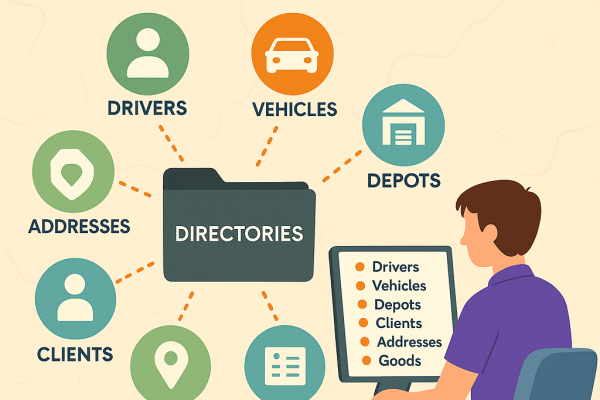Ranking High, Delivering Fast: How SEO Boosts Performance for Logistics Companies

by
Srushti Shah
October 06, 2023
Let us begin with a question:
What should you do first when seeking for a reliable local logistics partner near you? Find contacts in your old phonebook or local logistic enterprises in the newspaper? Unlikely.
Instead, what do we do? We Google! Because it is more simple, convenient and fast.
Most consumers leverage Google and other search engines to look for the products and services they need.
Logistics companies used to connect with clients offline. However, eCommerce and digitalization altered the industry.
Logistics businesses can stay ahead of the competition by implementing modern software, like route planners apps or mobile barcode scanners. But those aren't the only digital tools you can use for your business.
In order to get noticed online, businesses need a robust Search Engine Optimization (SEO) strategy.
SEO is a crucial way for logistics businesses to reach potential customers online and connect with them effectively.
In this post, we will break down the use cases of SEO for logistics businesses, explore its potential influence on the industry, and provide some real-life examples. Let’s dive in!
What is Search Engine Optimization (SEO)?
Search Engine Optimization (SEO) is a set of techniques and strategies to enhance a website's visibility and ranking on search engines like Google.
SEO aims to optimize various elements of a website, such as content, keywords, and links, to make it more appealing to search engine algorithms. With White Label SEO, agencies can deliver these optimizations under their own brand while leveraging expert strategies to improve rankings, visibility, and long-term organic growth.
This, in turn, helps the website appear higher in search results when users search for relevant keywords or phrases, ultimately driving more traffic and users to the site.
How can SEO impact logistics business?
Logistics companies play a pivotal role in delivering products worldwide.
In an increasingly interconnected world, their expertise is vital, ensuring goods arrive on time and in perfect condition, ultimately driving economic growth and customer satisfaction.
Efficiency, reliability, and adaptability are the hallmarks of a successful logistics business, powering the wheels of commerce.
When it comes to search engine optimization, this marketing strategy can bring significant benefits to logistics companies.
- A well-optimized website can significantly boost a company’s online visibility in the highly competitive logistics industry. Link-building strategies can further amplify your SEO efforts, securing high-quality backlinks to elevate your site's authority and search rankings.
- When managing outreach and backlink acquisition becomes difficult to handle internally, outsourcing link-building services can help maintain consistency and quality in backlink efforts. To ensure these backlinks are actually strengthening the site, a website authority checker can help track domain and page authority, providing insights into how well your link-building efforts are strengthening your site’s overall SEO performance.
- Monitoring authority scores this way helps ensure that your site not only ranks higher but also gains credibility in the eyes of potential clients. They can easily find your services when they search for logistics solutions, ultimately driving more traffic to your site and supporting better lead generation.
- Since link quality plays a major role in long-term rankings, many logistics companies work with Outreach Monks, a leading link-building agency for brands and agencies, to earn authoritative backlinks from logistics and supply-chain-related websites.
- SEO can enhance your credibility and trustworthiness in the industry, as a higher search engine ranking signals authority.
- Moreover, it can streamline your operations by attracting the right clientele, improving lead generation, and reducing marketing costs.
- Well-written, SEO-optimized content not only helps a logistics company rank higher in search results, but also nurtures visitors through the sales funnel, converting them into paying customers. To achieve this, businesses must ensure their content is high-quality and original. An AI detector can help safeguard against duplicate or low-value AI generated content that could harm SEO performance.
In a competitive sector like logistics, leveraging SEO can be the key to staying ahead of the competition and growing your business.
Now that you know what SEO is and how it can impact your company, let’s delve deeper and see exactly what you can get from using SEO for your logistics business.
And as SEO strategies evolve, many teams consider how AI generated content fits into their overall approach to scaling visibility and improving search performance.

Increase Visibility
The primary goal of search engine optimization is to get your business in front of customers looking for similar products and services on the web.
An all-rounded SEO strategy can help your website appear higher in search engine results pages (SERPs).
To gain this benefit, you need to integrate relevant and popular keywords into your content, optimize the work of your website, and use other SEO best practices to let Google give you higher positions.
That is, more people will be able to come across your site when they look up relevant terms on the Internet, which means you can get better visibility and brand recognition.
Keyword rank tracking is a vital component of your SEO strategy, as it allows you to monitor how well your chosen keywords are performing in search engine results pages (SERPs). You can do this with the help of the rank tracker tools that will help you see how high you rank for different search queries and provide lots of valuable insights in terms of SEO. Such tools will help you identify and address any gaps in your current logistics SEO strategies.
By regularly tracking your keyword rankings, you can assess whether your SEO efforts are paying off and make necessary adjustments to improve your website's visibility.
You can also make an app and integrate features that allow users to search for your content easily, enhancing user experience and potentially increasing engagement with your brand.
Case study: 20% traffic increase
Increased visibility on the web ultimately means more people coming to your website.
According to the Dalli Digital case study, the integration of SEO-optimized copy, mobile optimization, and improved website performance helped a logistics company acquire 20% more traffic.
If you wonder why this matters, more traffic means more opportunities to sell your service.
So, first and foremost, SEO affects business by increasing visibility in search engine results and driving traffic to your company’s domain.
Attract more customers
Conventional, offline advertising methods have worked for the logistics industry for decades. And in 2023, they still do.
However, digitalization is rapidly changing the rules of the game.
The Local Consumer Review Survey 2023 revealed that as many as 87% discovered and assessed local companies using Google in 2022.
This means attracting new customers, even if you are a small local logistics business, is easier when you have an online presence, and search optimization plays a massive role here.
As was mentioned earlier, SEO can help your company drive more traffic.
When your business website gains more traffic, it becomes more visible to potential customers, thus giving you a chance to capture more clients.
SEO also enhances customer satisfaction. It can improve website loading speeds, mobile friendliness, and content organization, making surfing more pleasant and ultimately increasing customer engagement.
Case study: 50.95% new users
Can search engine optimization really increase your number of customers? It sure can!
A case study by Digichefs revealed a 50.95% increase in new users for a shipping company that implemented a new, more effective SEO strategy.

Improve brand reputation
Most users don’t even go past the first page of search engine results.
Moreover, they are likelier to click on and buy from websites at the very top of the results.
In other words, modern consumers often trust Google’s suggestions and find websites at the top of SERPs to be the most trusted.
Therefore, we can conclude that building and implementing a solid SEO strategy can help you build a better reputation for your business.
You can look more authoritative and credible by getting higher positions in SERPs, and, as a result, people will trust you more.
Needless to say, reputation plays a massive role in the success of every business. So here you have one more reason to start thinking about SEO right now.
Case study: 123 referring domains
In a case study by ITForce, the agency reflects on the case of Xhovala, an Israel-based trucking company.
Despite over ten years of experience in the transport industry, the company had certain challenges in digital marketing and search engine optimization.
After taking a complex approach and revamping Xhovala’s strategy, ITForce increased the number of domains referring to the client’s website from only 2 to 123. This led to a significant increase in credibility and trust in the site in the search.
On top of that, the client increased its online visibility from 9% to 40% and scored 214 conversions.
Increase sales
Lastly, since search engine optimization can help your logistics company acquire more customers, it can also help you boost sales.
When you make your business visible to other companies and customers looking for similar services, you give them a chance to learn more about your brand and consider using it for their needs.

Case study: 112% increase in SEO leads
A case study by Today’s Local Media tells the success story of another logistics company - Container Kings.
Focused on growth and increasing sales, Container Kings teamed up with Today’s Local Media to improve their website, rethink their keyword strategy, handle on-page optimization, leverage local SEO, and strengthen the company’s link profile through link building outreach.
After two years of careful analysis, improvements, and hard work, the companies achieved impressive results - a whopping 92% increase in traffic and a 112% increase in leads.
Needless to say, more leads mean more chances to make a sale. So, this is one more example of how effective optimization can help logistics businesses thrive.
Moreover, cloud managed hosting enhances SEO for logistics businesses by ensuring fast load times, high uptime, and optimal server performance. According to Umair Hussain, Digital Marketing Manager at Cloudways, cloud managed hosting supports scalable infrastructure to handle traffic spikes from multiple regions, improving user experience and search rankings.
Recap
Today, search engine optimization remains one of the most powerful tools for businesses to grow, attract new customers, and generate higher revenues.
This is true for companies across all industries and verticals, and logistics is no exception.
Let’s recap the main benefits search engine optimization can bring to your logistics business.
- Improved visibility: Logistics is highly competitive, and a strong online presence can help companies stand out. Properly optimized websites with relevant keywords can improve search positions, making it easier for potential leads to find and choose your services.
- Consistent search results: Logistics companies rely heavily on online inquiries and bookings. SEO ensures that your company's website appears prominently when potential clients search for logistics solutions.
- Positive brand image: SEO helps logistics companies establish trust and credibility in the industry. When a company consistently appears at the top of search results, it suggests to customers that they are reputable and dependable, which is vital in a sector where reliability is paramount.
- Enhanced customer experience: SEO can improve the user experience on a logistics website. By optimizing site structure and content, it becomes easier for visitors to navigate, complete transactions, and find relevant information.
- Increased sales: SEO can increase sales for logistics businesses by improving their search engine visibility, making it easier for potential customers to find and engage with the company's services when searching for logistics solutions.
After reading this article, you now know exactly how SEO affects logistics.
So don’t hesitate to start investing more in search engine optimization. Rest assured, a solid strategy will help you achieve your set goals and ensure business growth and success in the long run!
About The Author
Srushti Shah
Srushti Shah is an ambitious, passionate, and out-of-the-box thinking woman having vast exposure in Digital Marketing. Her key focus is to serve her clients with the latest innovation in her field leading to fast and effective results.








